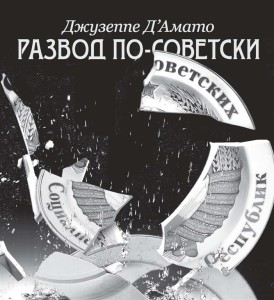Ukraine
Презентация книги «Развод по-советски». Русское издание
Состоится
Четверг – 19-го декабря в 11.30
при новой резиденции щвейцарского посла
125009 г. МОСКВА, МАЛЫЙ КИСЛОВСКИЙ ПЕР., Д.5А/8, СТР. 1
Читая мою смешанную российско-украинскую фейсбучную ленту, понимаю, что мы с украинцами живем не столько в разных мирах, сколько в разное время.
На Украине обсуждают гражданские протесты 2013 года с требованиями отставки правительства, президента, досрочных выборов и восстановления парламентской республики как системы власти.
В России обсуждают даже не «оттепель», а кино про «оттепель» полувековой давности.
Поэтому неудивительно, что наше общество (про власть и не говорю) раздражается, не понимая украинцев, вкладывая свой смысл в их слова и действия, — какого они сами не имеют в виду.
Это проще почувствовать, чем объяснить, и долго раскладывать по пунктам. Если примитивно и совсем коротко, то российское общество — как персонаж фантастического фильма, прилетевший на машине времени из недавнего прошлого: почти не отличается от окружающих внешне, но не может до конца врубиться в происходящее.
Простите, если вдруг кто-то обиделся, но я сам не украинец, россиянин. Ощутил это на себе и наблюдаю в беседах с соотечественниками.
Надо признать, что власти удалось нас подвесить во времени. И даже чуть отмотать.
Blog – Ayder Muzhdabaev – Айдер Муждабаев – Facebook –
Eastern Partnership, as one of the priorities of the Lithuanian Presidency of the Council of the EU, is a natural choice, determined by the Lithuanian and the EU interest to have safe, stable, economically strong and pro-European Eastern neighbours. Our goal is to have pro-active and efficient Eastern Partnership policy that would bring tangible results for these countries and their people. This could be achieved through the joint efforts of the EU institutions, EU Member States and Eastern Partners themselves. 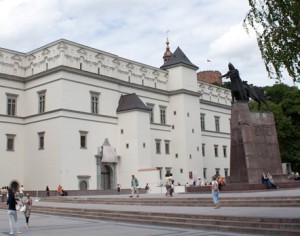
Through the Eastern Partnership, the EU strengthens its bilateral and multilateral cooperation with the six Eastern European partners: Armenia, Azerbaijan, Belarus, Georgia, Moldova and Ukraine, supports reform processes of these countries, and seeks to bring them closer to the EU.
Main results
Over the first four years of its implementation, Eastern Partnership initiative has brought a number of tangible results:
- Association Agreements, including Deep and Comprehensive Free Trade Areas, as their integral parts, have been negotiated with Ukraine, the Republic of Moldova, Georgia and Armenia; good progress has also been achieved in respective negotiations with Azerbaijan;
- considerable progress has been made in the area of visa facilitation and liberalization: 5 out of 6 partners already have or will soon have Visa Facilitation Agreements; 3 of them managed to advance even more – they now have Visa Liberalization Actions Plans, prepared specifically to them, full and effective implementation of which will bring these countries straight to the visa free travels with the EU;
- the multilateral cooperation dimension has been established and further strengthened: it now includes senior officials and experts working in a number of different areas, from agriculture and environment to trade, migration and CSDP;
- sectorial cooperation has also been enhanced, with the first Eastern partnership ministerial meetings in the fields of Justice and Home Affairs, and Transport, held in October 2013, in Luxembourg;
- cooperation between societies at large has been started and such formats as Civil Society Forum, Conference of the Regional and Local Authorities (CORLEAP), Business Forum and Youth Forum are now meeting on a regular basis, thus contributing to the monitoring of the implementation of the Eastern Partnership, but also to the policy shaping.
The third Eastern Partnership Summit in Vilnius
The third Eastern Partnership Summit in Vilnius will be held on the 28-29 November, 2013. The leaders and other high level representatives of the EU institutions, 28 EU Member States and the 6 Eastern European Partner States are expected to take part in the EaP Vilnius Summit. The event will be hosted by the President of the Republic of Lithuania Dalia Grybauskaitė and chaired by the President of the European Council Herman Van Rompuy.
Eastern Partnership Summits are held every two years (the first two Summits took place in the Czech Republic (Prague), 7 May, 2009, and in Poland (Warsaw), 29-30 September, 2011). During these meetings, the implementation and the results of the Eastern Partnership are discussed, the objectives for the next two years are determined and the prospects for the future are drawn.
Source: official site of the Summit
* * *
Joint statement by President of the European Council Herman Van Rompuy and President of the European Commission José Manuel Barroso on Ukraine
Concerning the Ukrainian decision to suspend temporarily the preparations for signing the Association Agreement and Deep and Comprehensive Free Trade Area (DCFTA), the European Union’s position remains clear. The offer of signing an unprecedented Association Agreement and a DCFTA is still on the table. This requires the necessary political will by the Ukrainian leadership, determined action and tangible progress on the conditions set out in December 2012.
Important progress has already been achieved by Ukraine. We are convinced that signing the Association Agreement and a DCFTA, the most ambitious agreement the European Union has ever offered, provides the best possible support for Ukraine’s economic situation, reform course and modernisation in view of building a prosperous and stable future for all Ukrainians. The EU stands ready to be more open and more supportive to those who are willing to engage in reforms and modernisation.
While being aware of the external pressure that Ukraine is experiencing, we believe that short term considerations should not override the long term benefits that this partnership would bring. However the European Union will not force Ukraine, or any other partner, to choose between the European Union or any other regional entity. It is up to Ukraine to freely decide what kind of engagement they seek with the European Union. Ukrainian citizens have again shown these last days that they fully understand and embrace the historic nature of the European association.
We therefore strongly disapprove of the Russian position and actions in this respect. The Association Agreement and a DCFTA are opportunities to accompany our common neighbours towards modern, prosperous and rule-based democracies. Stronger relations with the European Union do not come at the expense of relations between our Eastern partners and their other neighbours, such as Russia. The Eastern Partnership is conceived as a win-win where we all stand to gain. The European Union continues to stand ready to clarify to the Russian Federation the mutual beneficial impact of increased trade and exchanges with our neighbours, whilst fully respecting the sovereignty and independence of our Eastern Partners and the bilateral nature of Association Agreement and DCFTAs.
The European Union looks forward to the Eastern Partnership Summit in Vilnius this week. It will be an important moment to take stock of the situation and take forward the relations with our Eastern partners.
La battaglia è probabilmente finita. L’ultima incognita è legata alla tradizionale imprevedibilità degli ucraini. Ma se dovesse andare proprio in questo modo il processo di integrazione europea ad Est, nelle terre un tempo ex sovietiche, segnerebbe una brusca frenata.
Le pressioni del Cremlino sulla repubblica ex sorella hanno avuto, pertanto per ora, la meglio. Nei mesi scorsi la Russia ha iniziato a far capire a quali conseguenze spaventose l’Ucraina sarebbe andata incontro se Kiev avesse legato il suo destino all’Ue.
Mosca non intende avere concorrenti all’interno del suo “cortile di casa” è la lezione appresa in questi giorni tesissimi dai funzionari europei.
A nulla è valsa la dichiarazione al vetriolo della cancelliera tedesca Merkel, che ha ricordato a Vladimir Putin, che la “Guerra Fredda è finita da 24 anni” e che ogni Paese è sovrano di decidere la sua politica.
Il presidente Janukovich è stato posto davanti alla scelta tra il Patto Associativo con l’Ue e la concorrente nascente Unione Doganale, una specie di Urss economica. Il primo è un ottimo investimento sul futuro con vantaggi enormi nel lungo periodo. La seconda è un rattoppo utile nel breve periodo, ma un progetto troppo ambizioso che zoppica fin dai suoi esordi.
In sintesi, Kiev è rimasta stritolata in mezzo.
Dopo il voto negativo del Parlamento ucraino l’Unione europea lascia ancora la porta aperta, anche perché è finalmente conscia che Janukovich e i suoi si trovano davanti ad una decisione epocale, non solo economica ma anche geostrategica e psicologica.
Gli europei, per decenni satelliti del Cremlino, sanno perfettamente che la Russia senza l’Ucraina non potrebbe più essere in futuro un impero e verrebbe ricacciata ad Est, verso l’Asia. A Kiev è poi nata la Rus’ medioevale e da quelle radici storico-culturali-religiosi si è sviluppata successivamente la Moscovia.
Chi vincerà questo scontro geopolitico tra Russia ed Ue dovrà, comunque, farsi carico dell’Ucraina, Paese oggi sull’orlo di una gravissima crisi finanziaria. Nei prossimi mesi serviranno non meno di 10 miliardi di dollari per rimpinguare le asfittiche casse di Kiev.
Altrimenti l’intera Europa centrale sarà colpita da una nuova ondata di crisi.
gda
“As you know, the Kaliningrad region is isolated, geographically isolated, so we could apply some measures also to cut something,” said Linas Linkevicius, Lithuanian Foreign Minister. “Transport, we could cut off trains, but not only trains, also the supply of goods, whatever. It is theoretically possible,” the official added. 
Journalists raised the topic as Lithuania, which currently holds the rotating presidency in the EU, is preparing to host the Third Eastern Partnership Summit– the major conference dedicated to strengthening trade ties between the European economic bloc and six states in Eastern Europe and the Caucasus – Armenia, Azerbaijan, Belarus, Georgia, Moldova and Ukraine. All of these countries are Russian neighbors and close economic partners.
Russia is currently building its own economic bloc – the Customs Union – which currently consists of itself, Belarus and Kazakhstan, but to which it welcomes other neighboring nations.
Brussels is locked in an increasingly tense standoff with Moscow over its Eastern Partnership policy, which is designed to draw six countries — Ukraine, Belarus, Moldova, Georgia, Azerbaijan and Armenia — more closely into the European fold.
At the Vilnius summit on Nov. 28 to 29, the EU is expected to sign a free trade deal with Ukraine and take further steps towards free trade agreements with Moldova and Georgia. No substantial progress is expected with the other partnership states, which remain more closely aligned with the Kremlin.
The Cabinet of Ministers approved the draft Association Agreement between Ukraine and the European Union and its member states.
“It just became known that the government had approved the draft Association Agreement with the EU,” a government spokesman told journalists in Kyiv. The government published the draft agreement on the Web site of the Cabinet of Ministers in August 2013. 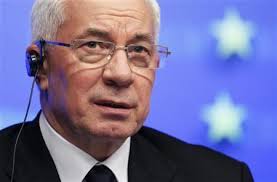
The 236-page document comprises of seven sections and 486 articles, some of which deal with the media activities, protection of personal data, protection of intellectual property, and other issues.
According to the draft agreement, the aims of association are to promote a gradual rapprochement between the parties based on common values and close and privileged links, and increasing Ukraine’s association with EU policies, and participation in programs and agencies, establish conditions for enhanced economic and trade relations leading towards Ukraine’s gradual integration in the EU internal market including by setting up a Deep and Comprehensive Free Trade Area, as well as to enhance cooperation in the field of justice, freedom and security with the aim of reinforcing the rule of law and the respect for human rights and fundamental freedoms.
Ukraine and the EU started negotiations on new agreement in 2007. The parties initialled an Agreement on association and profound and overall free trade area on March 30, 2012.
Ukrainian Prime Minister Mykola Azarov said the agreements, which should be signed at a November summit in Lithuania, raised the prospect of “a European quality of life” for the ex-Soviet republic.
“We believe we must make every effort for Yulia Tymoshenko to be freed before the Vilnius summit,” Iryna Gerashchenko, a deputy for the opposition party UDAR, told Interfax-Ukraine.
“Even though the signing is important to the EU and Ukraine, the EU will never be able to close its eyes to the violation of fundamental values such as human rights, including the right of defense in a court and the right to justice,” she said.
From Unian and Interfax-Ukraine
“On July 1st Croatia become the 28th member of the European Union. The lights of the welcome party have yet to be switched off and the hangover of reality is already setting in. Joining the EU is not the solution to Zagreb’s daily problems.
What a difference from the 2004 enlargement! At that time 10 states joined the European Union not only to create one of the largest areas of democracy and rule of law in the world but also because Europe wished to be closer to Yalta’s post World War II scenario…
Article – Giuseppe D’Amato – Kyiv Post – July 3, 2013.
The event is organized with support of Italian embassy in Kiev. Event’s official partners of are UniCredit Bank (General partner), Ferrero, Salini, Ukrainian international airlines, Iveco. Informational support – Presscom. 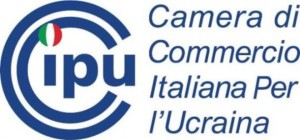
Schedule:
11-00 Exhibition of Italian masterpieces. The exhibition will be inaugurated by His Excellency Ambassador of Italian Republic to Ukraine Mr. Fabrizio Romano, and President of Italian commercial chamber in Ukraine Mr. Maurizio Carnevale. The entrance is free.
12:00 Presentation of Vittorio Varro’s art-zone. A group of students of Italian art-schools under supervision of Mr. Vittorio Varro will present 4 masterpieces within 2 days. The profit obtained from sale of these art products, will be used for charity purposes. The entrance is free.
14:00 Taste seminars. Italian producers of high quality products will present Italian wine industry to Ukrainian consumers. Pasta, Prosciutto, Ham, bread, confectionary, Parmesan, etc. and exclusive BEER will be available. Try Italian cuisine yourself! Pre-registration is required.
15:00 Made In Italy. Presentation of Italian commerce chamber’s projects in Ukraine, which are intended to promote Italian products and services in the field of tourism, food service, agriculture. Pre-registration is required.
11:00 Italian automobile-design review. (June 2, Kreshiatik str., start from Bessarabian square). Bikes and cars of famous Italian producers (Ferrari, Maserati, Lamborghini, and Ducati), will drive through the main street of Kiev. The Iveco super-truck, designed in a huge stage, will close the review and host the Italian music performance. The entrance is free.
ECHR-Ukraine, Tymoshenko arbitrarily detained.
30 Apr 2013 In today’s Chamber judgment in the case of Tymoshenko v. Ukraine (application no. 49872/11), which is not final, the European Court of Human Rights held, unanimously, that there had been: 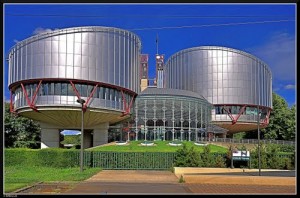
a violation of Article 5 § 1 (right to liberty and security) of the European Convention on Human Rights;
a violation of Article 5 § 4 (right to a speedy review of the lawfulness of detention);
a violation of Article 5 § 5 (right to compensation for unlawful detention);
a violation of Article 18 (limitation on use of restrictions on rights) in conjunction with Article 5;
and it held, by a majority, that there had been no violation of Article 3 (prohibition of inhuman or degrading treatment or punishment) in respect of Ms Tymoshenko’s alleged ill-treatment during her transfer to hospital on 20 April 2012 and the effectiveness of the investigation of those complaints.
The case concerned complaints related to the detention of the former Ukrainian Prime Minister Yuliya Tymoshenko. The Court held in particular: that Ms Tymoshenko’s pre-trial detention had been arbitrary; that the lawfulness of her detention had not been properly reviewed; and, that she had no possibility to seek compensation for her unlawful deprivation of liberty. The Court also found that, given that the judge had referred to her alleged hindering of the proceedings and contemptuous behaviour, her right to liberty had been restricted for other reasons than those permissible under Article 5.
Press Release – European Court of Human Rights April 30th, 2013.
EU 2014 – 20 budget “will enable us to finish the physical modernization of Poland, the building of our roads, rail and scientific infrastructure, and a chance for us to catch up with the rest of Europe.”
“We would like to have Western-style neighbours on both sides of the border – which is easier said than done.” (Ukraine, Lithuania)
Audio – Polish Radio
Welcome
We are a group of long experienced European journalists and intellectuals interested in international politics and culture. We would like to exchange our opinion on new Europe and Russia.
Categories
- Breaking News (11)
- CIS (129)
- Climate (2)
- Energy&Economy (115)
- EU Eastern Dimension (85)
- Euro 2012 – Sochi 2014 – World Cup 2018, Sport (43)
- Euro-Integration (135)
- History Culture (198)
- International Policy (261)
- Military (74)
- Interviews (18)
- Italy – Italia – Suisse (47)
- Odd Enough (10)
- Poland and Baltic States (126)
- Religion (31)
- Russia (421)
- Survey (4)
- Turning points (4)
- Ukraine (176)
- Российские страницы (113)
Archives
- November 2020
- October 2020
- September 2020
- August 2020
- July 2020
- May 2020
- April 2020
- March 2020
- January 2020
- December 2019
- November 2019
- October 2019
- September 2019
- August 2019
- July 2019
- June 2019
- May 2019
- April 2019
- March 2019
- February 2019
- December 2018
- November 2018
- October 2018
- September 2018
- August 2018
- July 2018
- June 2018
- May 2018
- April 2018
- March 2018
- February 2018
- January 2018
- December 2017
- November 2017
- October 2017
- September 2017
- August 2017
- July 2017
- May 2017
- March 2017
- January 2017
- December 2016
- November 2016
- October 2016
- September 2016
- July 2016
- June 2016
- May 2016
- April 2016
- February 2016
- January 2016
- November 2015
- October 2015
- September 2015
- June 2015
- April 2015
- March 2015
- February 2015
- January 2015
- December 2014
- November 2014
- October 2014
- September 2014
- August 2014
- July 2014
- June 2014
- May 2014
- April 2014
- March 2014
- February 2014
- January 2014
- December 2013
- November 2013
- October 2013
- September 2013
- August 2013
- July 2013
- June 2013
- May 2013
- April 2013
- March 2013
- February 2013
- January 2013
- December 2012
- November 2012
- October 2012
- September 2012
- August 2012
- July 2012
- June 2012
- May 2012
- April 2012
- March 2012
- February 2012
- January 2012
- December 2011
- November 2011
- October 2011
- September 2011
- August 2011
- July 2011
- June 2011
- May 2011
- April 2011
- March 2011
- February 2011
- January 2011
- December 2010
- November 2010
- October 2010
- September 2010
- August 2010
- July 2010
- June 2010
- May 2010
- April 2010
- March 2010
- February 2010
- January 2010
- December 2009
- November 2009
- October 2009
- September 2009
- August 2009
Our books





